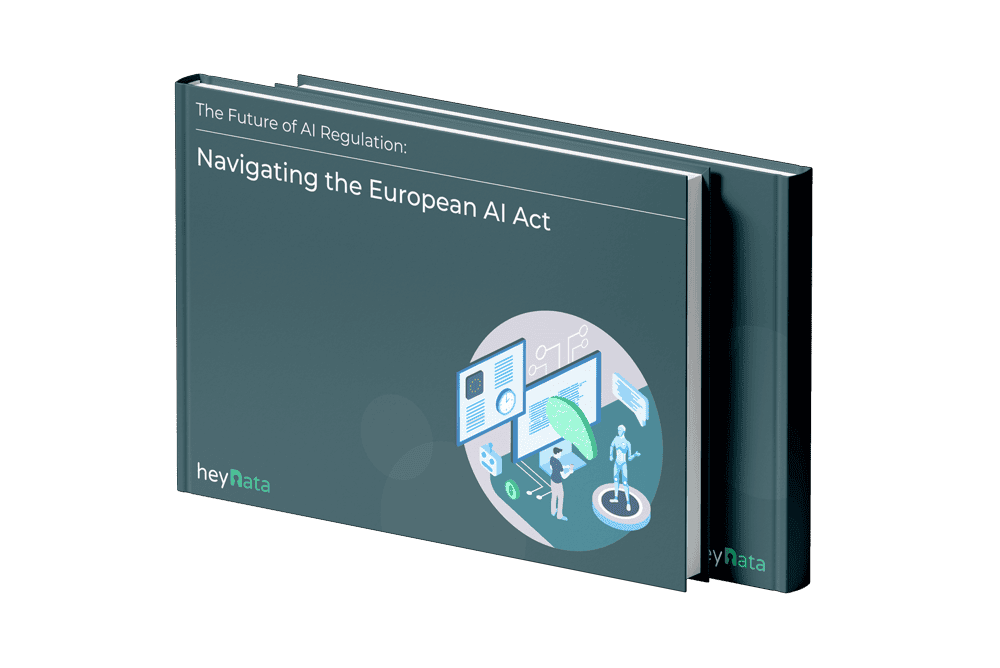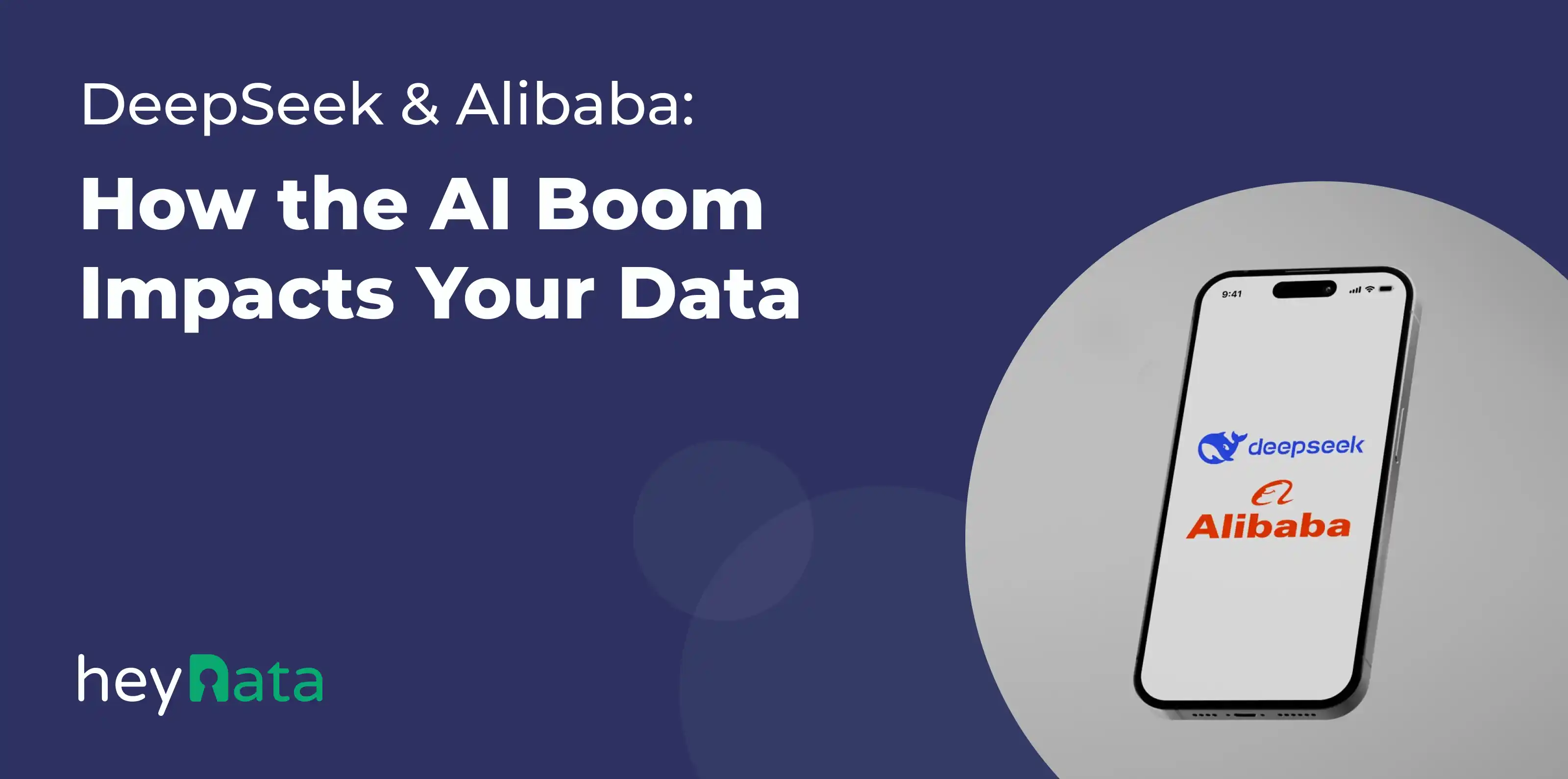
Master AI regulations effortlessly
A concise guide to the EU AI Act with compliance tips and key regulations.

DeepSeek & Alibaba: How the AI Boom Impacts Your Data
The AI race is intensifying, with new players emerging at an unprecedented pace. DeepSeek, a Chinese AI startup, has quickly risen to prominence with its R1 model, offering a level of performance that rivals OpenAI’s GPT-4o at just a fraction of the development cost. Meanwhile, Alibaba has entered the competition with Qwen 2.5, claiming it surpasses both DeepSeek and OpenAI’s offerings.
However, DeepSeek’s rapid success has raised ethical concerns. Critics argue that the company’s ability to develop high-performing models with limited resources may stem from leveraging research and results from OpenAI, rather than entirely original advancements. This raises serious questions about intellectual property rights, fair competition, and the integrity of AI development.
At the same time, the acceleration of AI innovation is outpacing regulatory safeguards, particularly regarding data protection, transparency, and user privacy. While DeepSeek and Alibaba push the boundaries of AI efficiency, how these models handle and secure data remains unclear.
While these developments reshape the AI industry, an important question remains:
What does this mean for data privacy and security?
Table of Contents:
DeepSeek vs. Alibaba: The Disruptors Shaking Up AI
For years, AI development has been dominated by U.S. companies such as OpenAI, Google, and Microsoft, which invested billions into training large-scale AI models on advanced hardware. In Europe, companies like Mistral or Aleph Alpha try to get a foot into the door.
Then came DeepSeek.
- DeepSeek’s R1 model achieves performance comparable to GPT-4o but at a fraction of the cost.
- The model was trained using older Nvidia chips, demonstrating that efficiency can rival sheer computing power.
- Within days, DeepSeek-R1 became the #1 AI app in the U.S., surpassing ChatGPT in Apple’s App Store rankings.
In response, Alibaba launched Qwen 2.5, positioning it as a superior alternative to both DeepSeek and OpenAI. Meanwhile, other Chinese tech companies, including ByteDance, Tencent, and Baidu, are racing to introduce their own advanced AI models.
This shift signifies a transition from a U.S.-dominated AI landscape to a highly competitive global market—but with it comes a pressing challenge: ensuring responsible AI development and protecting user data.
The Data Protection Dilemma: Who Controls Your Information?
The rapid deployment of AI models raises critical concerns regarding data collection, security, and regulatory compliance. AI models require enormous amounts of data to train effectively, and the lack of transparency in data sourcing has become a major issue.
1. Training Data: Where Does It Come From?
AI models are trained on vast datasets, but in many cases, there is little clarity on whether the data was legally obtained or used with proper consent.
- Some AI companies scrape publicly available data without explicit user permission.
- Copyright concerns have already led to lawsuits against OpenAI and Google, and similar scrutiny could arise for DeepSeek and Alibaba.
- In China, AI models operate under data regulations different from those in the EU or U.S., raising questions about their compliance with international privacy laws.
2. Security Risks in AI Development
As AI systems become more sophisticated, they process and store increasingly sensitive user data, making them prime targets for cyberattacks.
- If security protocols are weak, AI-generated insights and stored data could be exposed to malicious actors.
- There is limited information on how DeepSeek and Alibaba handle user inputs, data retention, and encryption.
- Without clear governance, businesses using these models may unknowingly expose themselves to compliance risks.
3. Are These AI Models Compliant With Global Regulations?
The European Union has introduced the AI Act, which will impose stricter requirements for AI transparency, data protection, and accountability. However, AI models developed outside the EU—such as those from DeepSeek and Alibaba—may not adhere to these standards.
- GDPR requires explicit consent for personal data usage, but it remains unclear if AI models from China follow these guidelines.
- Businesses deploying non-compliant AI tools could face fines, legal disputes, and reputational damage.
- Regulators in the U.S. and Europe are still working to establish clear oversight on AI model training and deployment.
Without strong privacy protections and compliance measures, AI innovation could lead to significant legal and ethical challenges.
Related Blog: Understanding and Implementing Data Protection Basics
How Businesses Can Protect Themselves in the AI Era
As AI technology continues to advance, businesses must ensure that the tools they use comply with evolving regulations, particularly the EU AI Act.
Key Considerations for Companies Using AI:
- Transparency: Work with AI providers that disclose how their models handle data and comply with regulations.
- Compliance with the EU AI Act: Identify AI risk categories, document usage, and ensure that AI systems meet legal and ethical standards.
- Proactive AI Governance: Prepare for upcoming regulatory enforcement by adopting structured compliance roadmaps and continuous monitoring.

Master AI regulations effortlessly
A concise guide to the EU AI Act with compliance tips and key regulations.
How heyData Supports AI Compliance Under the EU AI Act
heyData provides businesses with a structured, automated compliance solution to help them meet the requirements of the EU AI Act. Rather than mitigating AI security risks directly, AI Comply ensures that companies using or offering AI systems stay compliant with evolving regulations.
How AI Comply Helps Businesses:
- AI Risk Assessment & Compliance Roadmap – Classify AI systems, identify obligations, and create a tailored roadmap.
- Legally Compliant Documentation – Automate AI documentation to align with EU AI Act requirements.
- Training & Continuous Monitoring – Educate teams on responsible AI use and ensure ongoing compliance updates.
- AI Trust & Transparency – Strengthen credibility with an AI trust seal for responsible AI deployment.
Conclusion: AI Growth Must Be Matched with Responsible Data Protection
The rise of DeepSeek, Alibaba, and other AI disruptors is reshaping the global technology landscape. These models are not only challenging the dominance of U.S. AI companies but also pushing the limits of efficiency and accessibility.
However, the rapid development of AI must be accompanied by responsible data governance. Businesses that integrate AI tools without considering data protection risks may face significant consequences.
Key Takeaways:
- AI is becoming more powerful, but transparency remains an issue.
- Global compliance standards must be enforced to prevent data misuse.
- Companies need to adopt AI responsibly, ensuring security and legal compliance.
The future of AI depends not only on technological breakthroughs but also on ethical and regulatory safeguards. As the AI industry continues to expand, the winners will not just be those with the most advanced models—but those that prioritize trust, transparency, and data security.
Important: The content of this article is for informational purposes only and does not constitute legal advice. The information provided here is no substitute for personalized legal advice from a data protection officer or an attorney. We do not guarantee that the information provided is up to date, complete, or accurate. Any actions taken on the basis of the information contained in this article are at your own risk. We recommend that you always consult a data protection officer or an attorney with any legal questions or problems.


